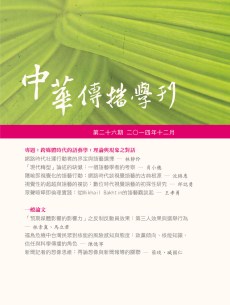 閱覽人數: 1971
閱覽人數: 1971
December
2014
No. 26
跨媒體時代的語藝學: 理論與現象之對話
Rhetoric in the Transmedia Age: A Dialogue between Theory and Phenomenon頁數:35 - 62
作者(中)
肖小穗
作者(英)
Xiao Xiaosui
關鍵詞(中)
現代轉型、語藝、史學論述、思想史、現代化變革
關鍵詞(英)
modern transformation, rhetoric, historiographical writing, history of thought, modernization-oriented reform *
中文摘要
本文探討史學論述與語藝的關係。作者從語藝學的角度,分析當代美國史學界有關中國現代轉型的四部重要論著,分別是《中國:傳統與變革》、《儒教中國及其現代命運》、《擺脫困境─新儒學與中國政治文化的演進》、和《危機中的中國知識份子:尋求秩序與意義》。這一分析旨在說明這些史學論著缺少一個語藝學的視角,而這一缺失意味著某個「人的視角」的缺席。本文還試圖說明即使是在現
有的這些論著的架構下,不少重要的「歷史事實」和「歷史發現」是在語藝的幫助下建構起來的。
有的這些論著的架構下,不少重要的「歷史事實」和「歷史發現」是在語藝的幫助下建構起來的。
英文摘要
This essay explores the relationship between historiographical writing and rhetoric. The author examines and discusses, from a rhetorical standpoint, four major historiographies that have substantially shaped American historical
writing on the period of China’s transition to a modern state (1890s-1920s). The historiographical writings include John K. Fairbank & Edwin O. Reischauer’s China: Tradition and Transformation (Fairbank & Reischauer, 1979/陳仲丹、潘興明與龐朝陽譯,1995), Joseph R. Levenson’s Confucian China and its modern fate (Levenson, 1968 /鄭大華、任菁譯,2000), Thomas A. Metzger’s Escape from predicament: Neo-Confucianism and China’s evolving political culture (1977), and Hao Chang’s Chinese intellectuals in crisis: Search for order and meaning (I890-1911) (Chang, 1987 /高力克、王躍譯,2006). The examination and discussion in this paper expresses regret for the lack of rhetorical insight into these historiographical writings. Nevertheless, the
author demonstrates that even within the historiographical frameworks of these works, rhetoric has served to construct many of the historical “facts” or “findings” that those writers have claimed to be true.
writing on the period of China’s transition to a modern state (1890s-1920s). The historiographical writings include John K. Fairbank & Edwin O. Reischauer’s China: Tradition and Transformation (Fairbank & Reischauer, 1979/陳仲丹、潘興明與龐朝陽譯,1995), Joseph R. Levenson’s Confucian China and its modern fate (Levenson, 1968 /鄭大華、任菁譯,2000), Thomas A. Metzger’s Escape from predicament: Neo-Confucianism and China’s evolving political culture (1977), and Hao Chang’s Chinese intellectuals in crisis: Search for order and meaning (I890-1911) (Chang, 1987 /高力克、王躍譯,2006). The examination and discussion in this paper expresses regret for the lack of rhetorical insight into these historiographical writings. Nevertheless, the
author demonstrates that even within the historiographical frameworks of these works, rhetoric has served to construct many of the historical “facts” or “findings” that those writers have claimed to be true.